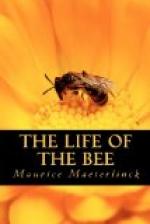if the harvest fail, or the hive be enlarged.
Often they will be retained so long as the young queen
have not accomplished, or succeeded in, her marriage
flight,—to be at once annihilated when
she returns, trailing behind her, trophy-wise, the
infallible sign of her impregnation. Who shall
say where the wisdom resides that can thus balance
present and future, and prefer what is not yet visible
to that which already is seen? Where the anonymous
prudence that selects and abandons, raises and lowers;
that of so many workers makes so many queens, and
of so many mothers can make a people of virgins?
We have said elsewhere that it lodged in the “Spirit
of the Hive,” but where shall this spirit of
the hive be looked for if not in the assembly of workers?
To be convinced of its residence there, we need not
perhaps have studied so closely the habits of this
royal republic. It was enough to place under
the microscope, as Dujardin, Brandt, Girard, Vogel,
and other entomologists have done, the little uncouth
and careworn head of the virgin worker side by side
with the somewhat empty skull of the queen and the
male’s magnificent cranium, glistening with
its twenty-six thousand eyes. Within this tiny
head we should find the workings of the vastest and
most magnificent brain of the hive: the most
beautiful and complex, the most perfect, that, in
another order and with a different organisation, is
to be found in nature after that of man. Here
again, as in every quarter where the scheme of the
world is known to us, there where the brain is, are
authority and victory, veritable strength and wisdom.
And here again it is an almost invisible atom of this
mysterious substance that organises and subjugates
matter, and is able to create its own little triumphant
and permanent place in the midst of the stupendous,
inert forces of nothingness and death.*
The brain of the bee, according to the calculation
of Dujardin, constitutes the 1-174th part of the insect’s
weight, and that of the ant the 1-296th. On the
other hand the peduncular parts, whose development
usually keeps pace with the triumphs the intellect
achieves over instinct, are somewhat less important
in the bee than in the ant. It would seem to
result from these estimates—which are of
course hypothetical, and deal with a matter that is
exceedingly obscure—that the intellectual
value of the bee and the ant must be more or less
equal.
[37]
And now to return to our swarming hive, where the
bees have already given the signal for departure,
without waiting for these reflections of ours to come
to an end. At the moment this signal is given,
it is as though one sudden mad impulse had simultaneously
flung open wide every single gate in the city; and
the black throng issues, or rather pours forth in
a double, or treble, or quadruple jet, as the number
of exits may be; in a tense, direct, vibrating, uninterrupted
stream that at once dissolves and melts into space,
where the myriad transparent, furious wings weave a




